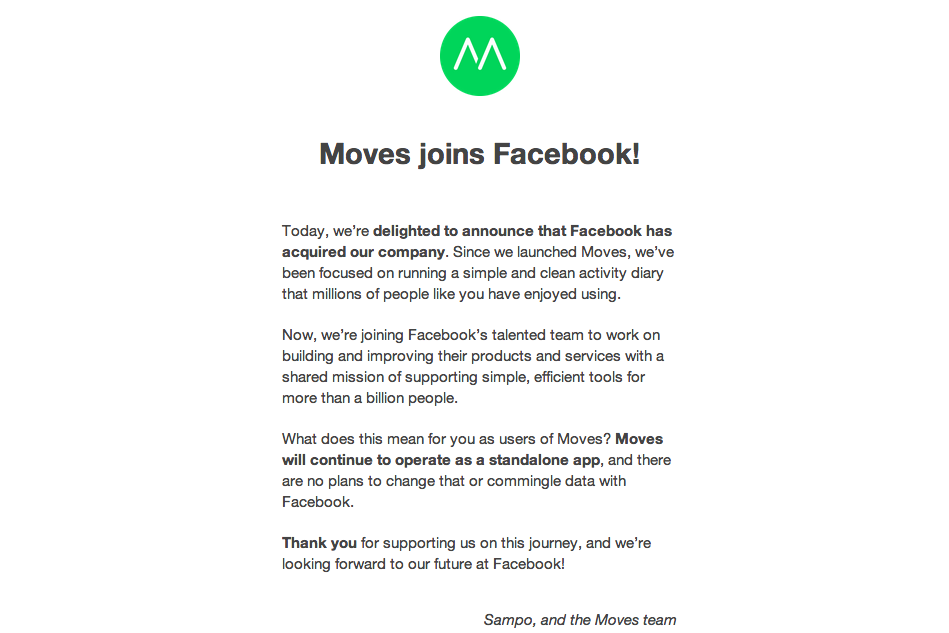
On April 24, the team behind fitness-tracking app Moves was purchased by Facebook for an undisclosed sum. The company assured users that it wouldn’t commingle data with Facebook. Ten days later it announced plans to share all its user data with the social network. Facebook now claims it will only use the shared data to provide support, but since it already lied once, and the social network has a checkered past of giving privacy the cold shoulder, we’re skeptical.
That got us wondering: what could Facebook do if it knew exactly where all its users were every minute of the day?
Data, say hello to advertisers
Facebook, like Google, makes its money by selling the information you have to advertisers. Traditionally, these companies buy ads on your News Feed page that are targeted at you based on the things you’ve Liked and talked about on Facebook. That is why you might not see the same ads as someone else. With Moves data, Facebook has a host of new information to sell to advertisers. Moves knows exactly how many steps you take, where you take them, and where you stop and hang out every day. If you use Moves, or an app that relies on it, Facebook is essentially able to watch you.
There are a lot of possibilities for targeted ads:
- Ads for the aspiring, but still sedentary user: You could end up seeing more ads about gym memberships if Facebook notices you haven’t been running a lot. Or maybe Facebook figures out that you’re addicted to trying to get fit, but always fail to ever reach your goals. Well-tailored ads could sucker you into buying something you don’t want.
- Feeding the fitness addict: On the other hand, if you have been running or riding your bike a lot, you could see advertisements for things such as running shoes, socks, and other assorted running gear, as well as marathons, protein bars, and more.
- Walking past a Starbucks? Since Moves tracks where you are, Facebook could sell local ads to any business you frequent or walk by. It may even know exactly where you stop for coffee each morning.
Insurance companies gain a watchful eye
Insurance companies could theoretically buy Moves data from Facebook. For years, insurance companies have been digging into online data and mining Facebook to identify risky people. Integrating health and fitness information could be a goldmine for Facebook, but also for insurers.
Facebook will definitely know where you sleep and where you work almost instantly.
In the United States, health insurance companies have to discover you’re a smoker to raise your premiums, but this may not be the case in all countries. Given the kind of data Moves gathers, it may even be possible for insurance companies (or Facebook) to eventually figure out who is a smoker and who isn’t, based on their movement to go outside and have a cigarette. Health insurance premiums can already rise up to 50 percent for smokers.
While we are mindful such a thing is far-reaching, it isn’t in the realm of impossibility. Theoretically, by combing through demographic data, insurance companies could also price their policies, determining risk for people of certain ages in certain areas.
Facebook knows exactly when and where you’re using it
Facebook could also use Moves data to know exactly where and how you use Facebook.
While information like that is juicy enough, imagine Facebook combining the location data with WhatsApp. It could theoretically know when and where you use WhatsApp, or when and where you use Instagram. So long as that Moves app is active, Facebook could simply filter out that location data to further derive information on its demographic. Eventually, it could know that you only browse your News Feed in the bathroom.
If nothing else, Facebook will definitely know where you sleep and where you work almost instantly.
Facebook will seek out new apps to get more data about you
Moves is designed to work as a step-counting backbone for other fitness apps. More than a dozen apps already connect to it, and the more that do, the larger Facebook’s reach will be into knowing exactly where its users are at all times. If the app (or its developer service) continues to gain in popularity, Facebook’s reach will expand. With a new generation of wristbands and smartwatches coming out this year, Facebook is making a strong play to own a good chunk of the fitness data that will churn over the Internet in the years to come.
In the future, you may connect to Facebook’s system in new ways without ever realizing it.
Hopefully the FTC will keep Facebook in line
In 2012, Facebook made an agreement with the Federal Trade Commission. According to the deal, Facebook is supposed to clearly and prominently notify users before their information is shared. On May 5, it did send out an email to Moves users notifying them of a policy change, but did not clearly state what it was. Facebook is also supposed to obtain express consent before sharing your information beyond any privacy settings you set, and maintain a privacy program that will protect your information.
- 1. April 24 email from Moves
- 2. May 5 email from Moves
The FTC was worried that Facebook wouldn’t adhere to the agreement when it purchased WhatsApp, so while it gave the deal its blessing, it was warned to adhere to that agreement. We assume that, given the precedent, the FTC would approve the Moves purchase under the same condition.
However, unless you have very strict privacy settings, all Facebook has to tell you is that your information will go somewhere.
There is a lot of good and bad things Facebook can do if it knows where all its users are at any time. Only time will tell how it uses them, but we should keep an eye out. Facebook has become an essential Internet communication utility for a lot of people. It has a right to make money, but we have a right to privacy as well.




